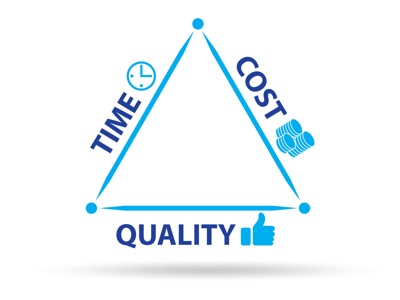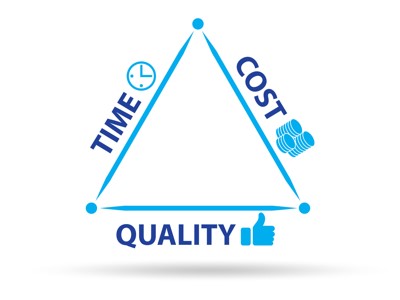One of the main responsibilities as a project manager is to ensure that a project is completed on time, within budget, and to the required quality standards.
This can be challenging, as you have to juggle multiple tasks, resources, and stakeholders, all while trying to meet the project’s objectives.
To succeed in this role, project managers must have a good understanding of the three main principles of project management: time, quality, and cost (whilst closely managing the scope of the project).
This is where industry experts with experience managing projects is essential. In this blog post, we’ll look at each of these principles and how they relate to project management.

Figure 1 – Core Principles of Project Management
Time (otherwise known as Schedule/Program)
Time is one of the most important factors in project management. Every project has a deadline, and it is the project manager’s job to make sure that the project is completed by that deadline. To do this, project managers need to plan the project carefully and make sure that there is a clear timeline for each task and deliverable.
One way to manage time effectively is to use a project management tool like Microsoft Project to create a “Gantt chart” (though, in reality – project managers often defer to a trusty MS Excel spreadsheet). These tools allow you to create a visual representation of your project, including the tasks, dependencies, and deadlines. They also allow you to track progress and identify any potential delays or issues.
In addition to using project management tools, there are a few other things project managers can do to manage time effectively:
- Set realistic deadlines: Make sure that the set deadlines for each task and deliverable are realistic. Project managers will generally consult with experts in their team to build a program. A good project manager will allow float in their program and closely manage the “critical path”.
- Communicate effectively: Project managers should ensure that everyone in the project team is aware of the project’s timeline and any deadlines that need to be met. This includes keeping stakeholders informed of any potential delays or issues.
- Monitor progress: Project managers should regularly check in on the progress of the project team and make sure that they are on track to meet deadlines. If there are any issues, project managers must take responsibility to come up with a plan to get the project back on track (e.g. applying more resources or doing tasks differently).
Quality
In addition to being completed on time, a project also needs to meet the required quality standards. This means that the deliverables should be functional, accurate, and meet the needs of the project’s stakeholders.
To ensure quality, project managers need to have a clear understanding of what is expected from the project and establish quality standards and guidelines. Project managers should also conduct regular quality checks and reviews to make sure that the project is on track.
There are a few key things project managers can do to ensure quality meets scope requirements for a project:
- Clearly define the scope of the project: Make sure that the project managerhas a clear understanding of what is expected from the project and that the project team is aware of the quality standards that need to be met.
- Use quality assurance techniques: There are a variety of techniques that you can use to ensure quality in a project, such as peer reviews, testing, and inspection. A project manager should include the appropriate techniques that are most suited to a specific project and make sure that they are properly implemented.
- Involve stakeholders: Involving stakeholders in the quality process can help ensure that a project meets their needs and expectations. A good project manager will obtain feedback from stakeholders and address any issues or concerns they may have with tasks or deliverables.
Cost
In addition to time and quality, cost is another important factor to consider in project management.
Every project has a budget, and it is the project manager’s job to make sure that the project remains within budget. This means carefully managing the project’s resources and identifying any potential cost savings.
Effective cost management involves identifying and controlling costs throughout the project lifecycle, from planning to execution. This includes accurately estimating costs, setting budgets, and tracking expenses to ensure that they remain within the allocated budget.
Proper cost management is crucial for several reasons. Firstly, it helps to ensure that the project is financially viable and does not incur any unexpected costs that could impact the project’s overall profitability.
Cost management allows the project manager to make informed decisions about how to allocate resources and prioritize tasks in order to stay within budget. Additionally, effective cost management is important for stakeholder relations, as it helps to ensure that the project is delivered on time and within budget, which can help to build trust and confidence in the project team.
Summary
This blog has not touched upon various types / methodologies of project management frameworks, however the core principles of project management apply to various types.
Our team have significant experience in various types of project management, from Project Management Body of Knowledge (PMBoK) to Prince2, Agile and Waterfall.
These terms are basically fancy names for frameworks which focus on the abovementioned core functions (scope, time, quality and cost).














